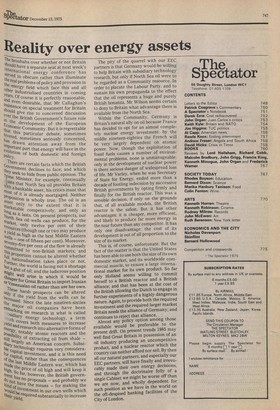Reality over energy assets
The brouhaha over whether or not Britain Should have a separate seat at next week's International energy conference. has served to obscure rather than illuminate the real problems of policy and provision in the energy field which face this andall Other industrialised countries in coming Years. Of course it is perfectly reasonable, and even, desirable, that Mr Callaghan's Insistence on special treatment for Britain should give rise to concerned discussion Over the British Government's future role 111 the development of the European Economic Community. But it is regrettable Lai` this particular debate, sometimes fevered, sometimes seriously concerned, has drawn attention away from the IrclPortant part that energy will have in the evolution of both domestic and foreign There are certain facts which the British ,GLovernment declines to face; and which they seek to hide from public opinion. The Ihrie Minister, for example, continually ',1sts that North Sea oil provides Britain With a bankable asset; his critics insist that !host of it is already mortgaged. Neither ProPosition is wholly true. The oil is an asset only to the extent that it is liharketable competitively; and only as x(),ng as it lasts. On present prospects, our "oh Sea oil wells can produce, for the rrnarket, only twelve per cent of their eseurces (though one or two may produce a Yield as high as the best Middle Eastern 1Y_ ells — one of fifteen per cent). Moreover, sceventy-five per cent of the flow is already tirinaitted to non-British markets; and f,.;s Proportion cannot be altered whether p`'Ll nationalisation takes place or not. b„tifther, the world is facing not a shortage ".t a glut of oil; and the ludicrous position 'g ht well arise in which it would be 2IeaPer for Great Britain to import Iranian Lir Venezualan oil rather than use her own. 0 These harsh prospects can be altered innlY If the yield from the wells can be tnhereased. Since the late nineteen-sixties . major oil companies have been —uatking on research in what is called f'sidiary energy technology, a term 'eh covers both measures to increase yeteld and research into alternative forms of oll'oerP, notably atomic reactors and the sr:1,1314Y of extracting oil from shale Largely an American concern. Subsi111141 technology requires very considerafoe capital investment, and it is this need caPital, rather than the consequences the last h"liade the Middle Eastern war, which has Price of oil high and will keep it nIge,,,11; far, however, the British governdo has no proposals — and probably we kinhot have the means — for making the investment in our own wells which th 1-.1Le be required substantially to increase ellYield, The pity of the quarrel with our EEC partners is that Germany would be willing to help Britain with subsidiary technology research, but only if North Sea oil were to be regarded as a Community resource. In order to placate the Labour Party, and to sustain his own propaganda to the effect that the oil represents a huge and purely British bonanza, Mr Wilson seems certain to deny to Britain what advantage there is available from the North Sea. Within the Community, Germany is Britain's natural ally on oil because France has decided to opt for an almost comple tely nuclear energy investment; by the middle nineteen-eighties the French will be very largely dependent on atomic power. Now, though the exploitation of fossil fuels causes a number of environmental problems, none is unmanageable: only in the development of nuclear power is there serious danger of widespread loss of life. Mr Varley, when he was Secretary of State for Energy, ended more than a decade of footling indecision by successive British governments by opting firmly and finally for the British reactor. This was a sensible decision, if only on the grounds that, of all available models, the British reactor is the safest. But it has other advantages: it is cheaper, more efficient, and likely to produce far more energy in the near future than any competitor. It has only one disadvantage: the cost of its development is out of all proportion to the size of its market. This is, of course, unfortunate. But the fact of the matter is that the United States has been able to use both the size of its own domestic market, and its worldwide commercial muscle, to ensure a large international market for its own product. So far only Holland seems willing to commit herself to a British reactor and a British alliance; and that has been at the cost of the British allowing the Dutch to engage in further experiments of a highly dangerous nature. Again, to provide both the required investment and the required larger market Britain needs the alliance of Germany; and continues to reject that alliance. Almost any policy option among those available would be preferable to the present drift. On present trends 1985 may well find Great Britain in possession of an oil industry producing an uncompetitive product, and a nuclear reactor which the country can neither afford nor sell. By then all our natural partners, and especially our EEC partners, will have finally and irrevo cably made their own energy decisions, and through the doctrinaire folly of a single Cabinet we might be worse off than we are now, and wholly dependent for such position as we have in the world on the oft-despised banking facilities of the City of London.

































 Previous page
Previous page